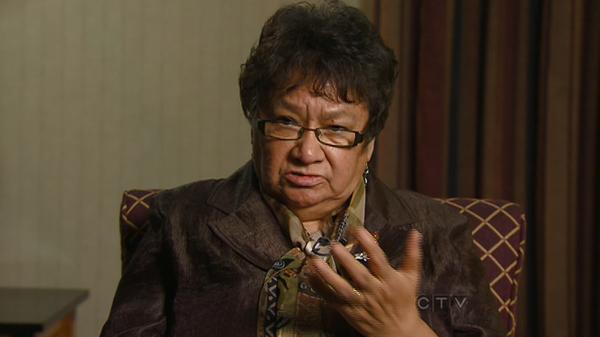CTV
December 13, 2011
http://m.ctv.ca/topstories/20111213/attawapiskat-resident-reveals-sex-abuse-111213.html
 |
| Mary Lou, Jocelyn Iahtail's mother, speaks with CTV News. |
While Attawapiskat has been thrust into the national spotlight because of a long-running housing problem, the attention is also exposing another major crisis in the impoverished community.
Jocelyn Iahtail, a former resident of Attawapiskat, is now coming forward with personal recollections of abuse.
Iahtail says the sexual abuse and incest is an epidemic that spans generations; a scourge that plagues the community in a way that is impossible to ignore any longer.
"The most frightening part is people know," Iahtail told CTV's Daniele Hamamdjian.
Iahtail says the abuse began when she was only four, and continued until she was 13. She says the abusers were people that she trusted, including relatives of some council members.
Iahtail says the abuse in communities like hers is cyclical and systemic.
Iahtail's mother, Mary Lou, says she was abused while attending residential schools and on the reserve, victimized by family and the clergy.
"My relatives, the priest, the nun's and the brothers," Mary Lou recalls.
Recalling her childhood, Iahtail also says the abuse affected every portion of her young life.
"I would become so overcome with nausea and vomiting. Just the simple act of brushing my teeth, because of the oral sex that I was forced to perform."
Iahtail and her mother decided to speak out this week because the pain continues to be pervasive in their community.
They say they also want to break the cycle of abuse that has scarred her and many others.
The scars on the community are obvious, Iahtail says: suicide, alcohol and drug abuse, gas sniffing and violence are mere symptoms. Indeed, while abuse may be less visible than squalid shacks and poor housing, it also insidious and destructive.
But because of familial ties and the tight-knit nature of many Aboriginal communities, exposing the abuse remains difficult.
The subject is also considered taboo and off-limits, given the shame and pain it elicits.
"You have a lot of individuals who say it is bad medicine to speak about the extent of sexual abuse in our communities," she said
"I can't even give you a number because there's so many … male and female."
According to some estimates, the level of abuse is staggering.
"Sexual violence and sexual abuse in Aboriginal communities affect 75 to 80 per cent of our girls and women," said social worker Sylvia Maracle, from the Ontario Federation of Friendship Centres.
With such an endemic problem, Iahtail says it's difficult to know where to start.
And while Iahtail doesn't want to take away from the current housing problems gripping the community, she said that it's time to address other pressing issues and bring them out of the shadows
Shawn Atleo, national chief of the Assembly of First Nations, said that the abuse issue is one of the reasons why the entire system of reserves needs to be dismantled.
"This is why First Nations are calling for transformative change -- to smash the status quo," he responded.
According to Maracle, school officials have cautioned her about the issue, hinting that the abuse is so widespread that resources simply aren't available to deal with all the cases.
Any original material on these pages is copyright © BishopAccountability.org 2004. Reproduce freely with attribution.